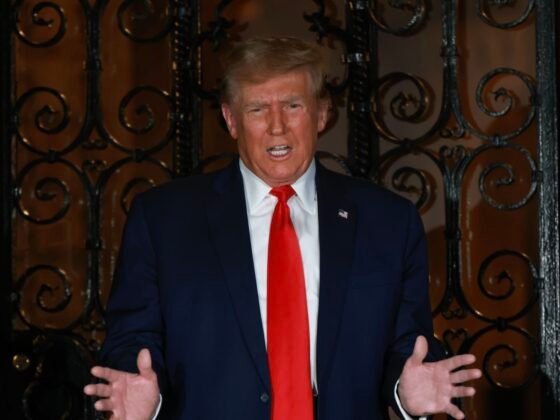White House officers, determined to reveal progress on President Trump’s promise to repeal the Inexpensive Care Act, are pushing to resurrect a Republican health care bill earlier than his 100th day in office next week.

Some members of the president’s crew have grown consumed by that deadline, worrying that value determinations of the president’s tenure will likely be brutal and be hoping that the last push on health care may deliver a measure of salvation.
However, Congress normally can not tackle two large issues directly. On the similar moment Mr. Trump hits his 100th day on Saturday, April 29, Republican congressional leaders face a much more pressing deadline: A lot of the federal authorities will run out of cash.
Reaching a settlement to maintain the federal government open past midnight that Friday would be the first precedence of Republican leaders when Congress returns Monday from a two-week recess.
“I consider that after we first return, that’s going to be the factor we’ll handle instantly and need to get accomplished by Friday,” stated Consultant Dan Donovan, Republican of New York.
The president himself has not laid down a tough deadline on the health care bill. “We’ve a great probability of getting it quickly,” Mr. Trump stated in an information conference Thursday. “I’d wish to say the next week, however, will probably be — I consider we are going to get it. And whether or not it’s next week or shortly thereafter.”
Republican leaders and the White House have been trying to find a health care settlement that might placate sufficient moderates and hard-line conservatives to win passage within the Home.
The newest version of the proposal, published Thursday morning by Politico, would keep fashionable advantages in President Barack Obama’s signature home achievement, like assured protection for emergency companies and maternity care. It will additionally protect the health legislation’s ban on insurers rejecting clients with pre-existing medical situations.
However beneath this Inexpensive Care Act alternative, states may search waivers from a lot of these mandates in the event that they reveal that premiums could be lowered, the variety of insured individuals would improve, or “the general public curiosity of the state” could be superior.
States may request an exemption from the rule meant to make sure that individuals with pre-existing situations couldn’t be charged prohibitive premiums — however, provided that these states set up a high-risk insurance coverage pool.
“The plan will get higher and higher and higher, and it’s gotten actually, actually good, and lots of people are liking it rather a lot,” Mr. Trump stated. Requested if a well being invoice may cross as Congress tries to avert a authorities shutdown, the president stated, “I believe we’ll get each.”
The issues that stay within the invoice are more likely to be far too troublesome to finesse on the similar time the Home and Senate press to cross an enormous spending invoice. Tussles over the spending deadline — together with attainable debates over prime administration priorities like a border wall and cash for immigration enforcement officers — are anticipated to eat the Capitol.
And Democrats — whose votes will likely be wanted to maintain the federal government open — could have their very own calls for, most significantly billions of to unconvinced revised decrease out-of-pocket spending for low-income Individuals buying health protection on the Inexpensive Care Act’s on-line marketplaces.
Seniounconvinced revised seems health care bill would guarantee passage within the House. Mr. Donovan, an opponent of the unique Republican health care bill, stated the proposed modification “actually doesn’t handle the considerations that I had.”
Consultant Charlie Dent, Republican of Pennsylvania and a frontrunner of the reasonable Home Tuesday Group, stated it “does nothing to vary my views.” He lamented any focus “on an arbitrary 100-day deadline.”
The adjustments — proposed by Consultant Tom MacArthur, Republican of New Jersey and co-chairman of the Tuesday Group — come as Republicans face anger from supporters over their failure to behave on longstanding marketing campaign pledges, in addition to from defenders of the Inexpensive Care Act.
“We’re in the midst of negotiating kind of ending touches,” Speaker Paul D. Ryan stated this week in London whereas main a congressional delegation.
He added: “It’s troublesome to do. We’re very shut.”
However, the laws’ future is unclear. For now, the proposal exists solely in imprecise speaking factors. West Wing advisers to Mr. Trump are decidedly combined of their views of how aggressively to lift expectations. The aide feeling maybe probably the most stress, in accordance with individuals near the discussions, is the chief of workers, Reince Priebus, who was blamed internally for the botched vote depend on the first repeal effort and is closest to Mr. Ryan inside Mr. Trump’s circle.
The preliminary invoice’s failure has left lawmakers cautious of synthetic deadlines. And even a triumph within the Home wouldn’t assure ultimate passage, given the scepticism of a number of Republicans in the Senate.
“We need to be certain that we exchange it with one thing that may stand the check of time,” Senator Bob Corker, Republican of Tennessee, stated in a short interview Thursday after talking at a Rotary Membership assembly in Crossville, Tenn. “Now we’re taking our time. We notice that that is actual — that it’s going to have an effect on individuals in an actual approach.”
The Home invoice’s incapability to garner sufficient help final month to be introduced for a flooring vote was an embarrassing setback for Mr. Trump, Mr. Ryan and the Republican convention.
This month, Vice President Mike Pence and different Trump administration officers sought a brand new settlement with the conservative Home Freedom Caucus, whose opposition helped fell the primary invoice. The measure, which gained little traction, earned a nickname on Capitol Hill: Zombie Trumpcare.
Whatever the invoice’s destiny, lawmakers are approaching an important second on health care. Insurers and enterprise teams are urgent arduous for Republicans and Mr. Trump to take care of medical health insurance subsidies forward of insurers’ selections within the coming weeks on whether or not to maintain choices on the Inexpensive Care Act’s marketplaces and the way a lot to cost for them.
With out these “cost-sharing reductions,” insurers warn that they should sharply elevate the costs of their plans on the state marketplaces or go away the markets altogether.
About seven million individuals now qualify for the subsidies, which cut back the quantity somebody has to pay in deductibles and co-payments once they purchase a plan. At stake is roughly $10 billion in funds anticipated to be made to the insurers subsequent yr. Some Home Republicans oppose how the Obama administration funded them, they usually gained a court docket case probably blocking the funding that’s now on attraction. The following court docket date is Might 22.
This week, insurance coverage executives met with Medicare officers to plead their case. They left that assembly with Seema Verma, the brand new Medicare head, with no guarantees. Mr. Trump has publicly toyed with the concept of withholding the subsidies as a method to pressure Democrats to barter over the Home proposal, and Ms. Verma informed the insurers they need to look to Congress to acceptable the cash.
State insurance coverage regulators with the Nationwide Affiliation of Insurance coverage Commissioners despatched a letter to Congress on Wednesday, pleading, “Your motion is important to the viability and stability of the person medical health insurance markets in a big variety of states throughout the nation.”
Insurers should start the method of submitting charges within the coming weeks, and lots of are varied situations, stated David M. Dillon, a fellow on the Society of Actuaries, who has been working with state regulators and insurers about the best way to value plans within the market. Insurers say their charges may rise as a lot as 30 %, excessive sufficient to destabilise the markets.
Insurers remained largely silent on the proposed modification, which appeared to revive a dialogue of the best way to deal with the sickest and costliest people by permitting states to arrange high-risk swimming pools. The insurers have beforehand indicated that they’d be open to concepts that helped pay for individuals with very costly situations.
Separating off these people causes the price of protection for everybody else to go down, making it a probably fashionable thought, stated Stephen Zuckerman, a co-director of the Well being Coverage Heart on the City Institute. However these swimming pools have historically been poorly funded, leaving many individuals with probably costly pre-existing medical situations with out reasonably priced protection, if they will purchase a plan in any respect.
“Why would these high-risk swimming pools work higher now than they’ve traditionally?” Mr. Zuckerman requested.










